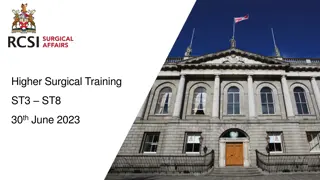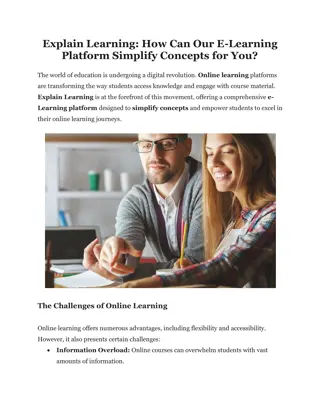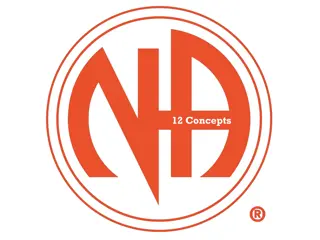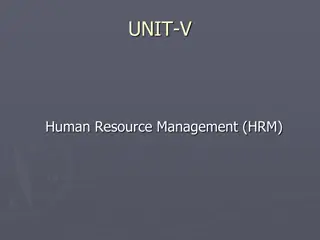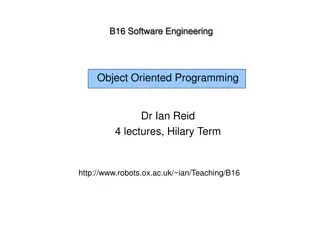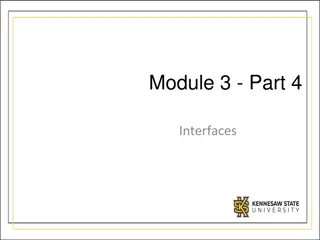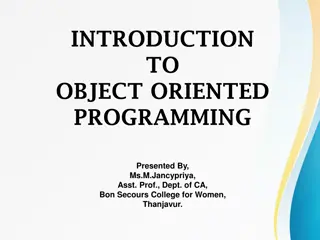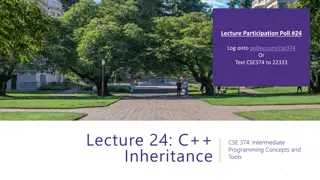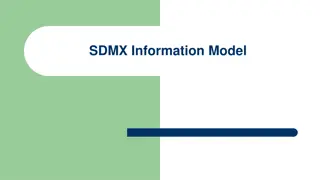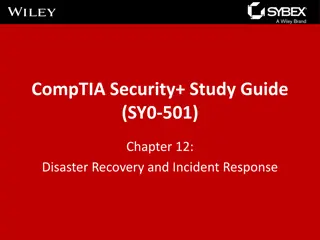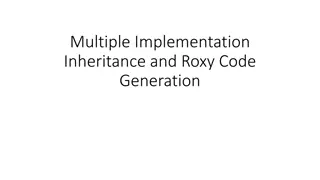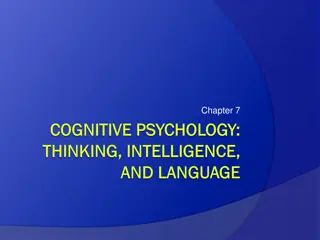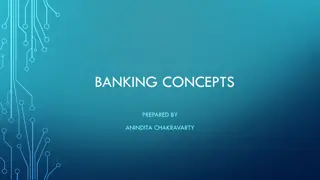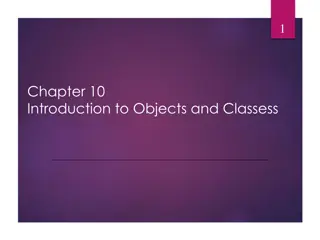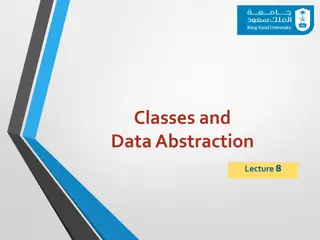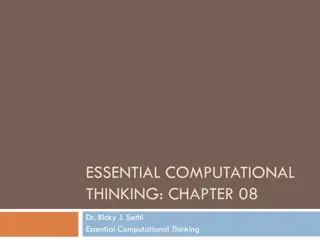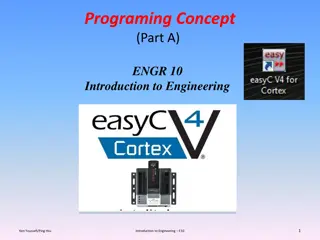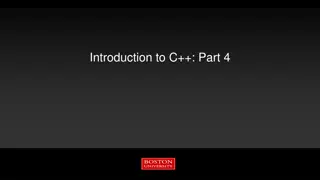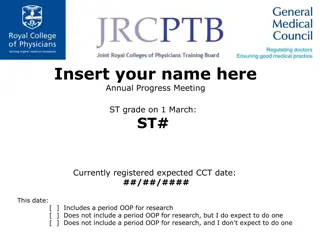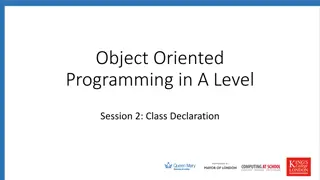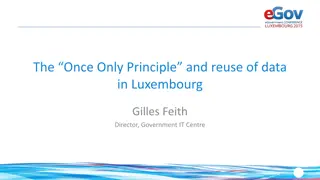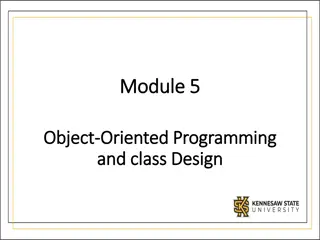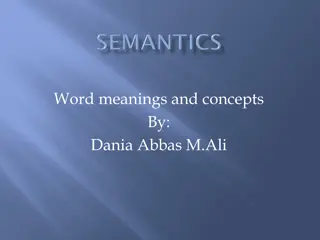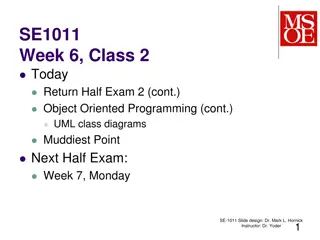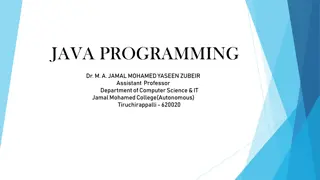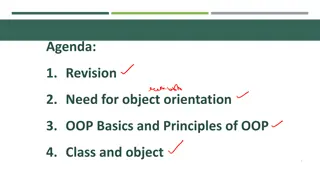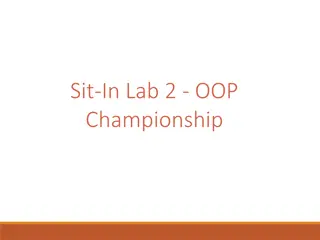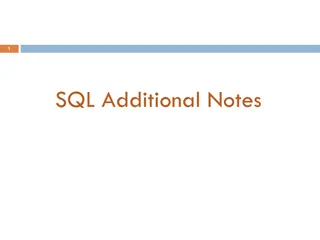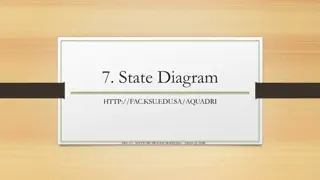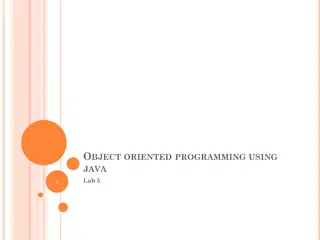Understanding Machine Learning Concepts: Linear Classification and Logistic Regression
Explore the fundamentals of machine learning through concepts such as Deterministic Learning, Linear Classification, and Logistic Regression. Gain insights on linear hyperplanes, margin computation, and the uniqueness of functions found in logistic regression. Enhance your understanding of these key
6 views • 62 slides
Higher Specialty Training (HST) in Surgery: Oversight and Governance
Higher Specialty Training in Surgery provides a structured curriculum encompassing operative procedures, assessments, ARCP, OOP opportunities, research, examination, and the CCST. The program ensures competency progression, post-CCST fellowships, and adherence to governance standards set by organiza
0 views • 26 slides
Contrasting Concepts in Political Science: Normative vs Descriptive Approaches
Normative and descriptive concepts in Political Science explore contrasting viewpoints on how things should be versus how they actually are. While normative claims focus on value judgments, descriptive claims deal with facts. These concepts complement each other by providing both theoretical and pra
0 views • 10 slides
Explain Learning How Can Our E-Learning Platform Simplify Concepts for You
Explain Learning is at the forefront of this movement, offering a comprehensive e-learning platform designed to simplify concepts and empower students to excel in their online learning journeys. Know more \/\/explainlearning.com\/blog\/explain-learning-e-learning-platform-simplifies-concepts\/
1 views • 4 slides
NA Service Structure: 12 Concepts for Effective Leadership & Accountability
The NA service structure is guided by 12 Concepts to ensure effective leadership, accountability, and decision-making within Narcotics Anonymous groups. These Concepts emphasize the importance of group unity, delegation of authority, and spiritual guidance in fulfilling NA's primary purpose. Trusted
1 views • 22 slides
Comprehensive Overview of Human Resource Management (HRM) Concepts
Explore the key aspects of Human Resource Management (HRM) including concepts, functions, and development. Learn about HRM vs. Personnel Management, functions of HR Manager, and the differences between HRM and HRD. Dive into the definition of HRM, concepts of HRM, functions of personnel management,
1 views • 24 slides
Object-Oriented Programming in C++ with Dr. Ian Reid - Course Overview
Dive into the world of object-oriented programming with Dr. Ian Reid's course on C++. Learn about classes, methods, inheritance, polymorphism, and design patterns. Understand the principles of OOP and how to implement them using C++. Enhance your skills in data hiding, encapsulation, and templates.
3 views • 78 slides
Understanding Interfaces in Object-Oriented Programming
Interfaces in OOP provide a way for unrelated classes to share common methods without implementation details. They serve as a set of requirements that must be implemented by classes. By creating interfaces, we can enforce standards and avoid issues like the "Diamond of Death" problem that arises fro
1 views • 17 slides
Understanding Object Oriented Programming (OOP) Principles
Object-Oriented Programming (OOP) is a software design approach where programmers define data structures and operations. Key principles include objects, classes, data encapsulation, inheritance, polymorphism, and data abstraction. OOP allows for better organization and reusability of code, fostering
0 views • 15 slides
Intermediate Concepts in C++ Inheritance - Lecture Participation Poll #24
Explore the advanced topic of C++ inheritance through Lecture Participation Poll #24 in CSE 374. Dive into the concepts with examples and code snippets covering class inheritance, virtual functions, and more. Don't miss out on this opportunity to enhance your understanding of intermediate programmin
0 views • 31 slides
Understanding Data Models in the Context of SDMX
Explore the importance of properly describing data, developing a data model for exchange, and identifying concepts in the SDMX context. Figures vs. data on the number of touristic establishments in Italy, along with visuals, illustrate key concepts like Data Structure Definitions. Learn how to ident
0 views • 46 slides
Understanding Hinduism: Beliefs, Practices, and Concepts
Hinduism, originating in the Indus Valley, is a diverse religion with beliefs in karma, reincarnation, and a multitude of deities. Concepts like Atman, Dharma, and Varna play vital roles in shaping Hindu philosophy and practices. Explore the essence of Hinduism through its ancient texts, traditions,
8 views • 50 slides
Disaster Recovery and Incident Response Concepts
This content covers the essential concepts of disaster recovery, incident response, penetration testing, vulnerability scanning, and business continuity planning in the context of cybersecurity. It explains the goals and steps involved in penetration testing, vulnerability scanning tasks, business c
2 views • 15 slides
Understanding Multiple Implementation Inheritance and Roxy Code Generation
Exploring the concept of software building blocks and concerns in Object-Oriented Programming (OOP), highlighting the importance of managing multiple concerns within classes. Delve into the challenges and solutions of multi-concern implementation including the use of mixins and plugin-based imitatio
1 views • 9 slides
Understanding Cognitive Psychology: Thinking, Intelligence, and Language
Cognitive psychology explores the processes of thinking, intelligence, and language. It delves into mental activities such as organizing information, problem-solving, and forming concepts. Concepts like superordinate, basic level, and subordinate concepts are discussed alongside problem-solving meth
0 views • 37 slides
Understanding Theories and Concepts in Research
The content delves into the fundamental concepts of theories and variables in research. It discusses the nature of theories, including descriptive, explanatory, and predictive theories. Additionally, it examines the role of concepts in providing identity and meaning to objects and phenomena. Through
2 views • 55 slides
Understanding Banking Concepts and Monetary Policies
Explore key banking concepts such as Currency Deposit Ratio, Reserve Deposit Ratio, Statutory Liquidity Ratio, High-Powered Money, and their significance in regulating the money supply and liquidity in an economy. These concepts shed light on the relationship between currency, deposits, reserves, an
0 views • 14 slides
Software Engineering Design Principles and Concepts
The chapter discusses the essential principles and concepts in software design, highlighting the four key design models - data design, architectural design, interface design, and component-level design. It emphasizes the importance of traceability to the analysis model, minimizing the gap between so
0 views • 36 slides
Understanding Object-Oriented Programming (OOP) in Python
Python is a versatile programming language that supports various programming approaches. Object-Oriented Programming (OOP) is a popular method in Python where objects are created to solve programming problems. OOP in Python focuses on creating reusable code, following the principle of DRY (Don't Rep
1 views • 35 slides
Understanding Object-Oriented Programming Concepts
Object-oriented programming (OOP) is a powerful paradigm that helps in organizing and designing programs effectively. This summary covers key aspects such as designing a program, top-down structured design, the importance of OOD, defining objects, identity, state, behavior in OOP, and examples of st
2 views • 18 slides
Understanding Classes and Data Abstraction in Object-Oriented Programming
Object-oriented programming (OOP) encapsulates data and functions into classes, akin to blueprints for creating objects. This lecture delves into the relationship between classes, objects, data members, member functions, and user-defined types. It emphasizes the reuse and encapsulation of code, info
5 views • 22 slides
Introduction to Object-Oriented Programming in CS with RPG Example
Today's session focuses on introducing Object-Oriented Programming (OOP) and its concepts through a Role-Playing Game (RPG) example. The content covers the transition from Procedural Programming to OOP, encapsulating data in objects, and practical implementation with a hero, goblin, and multiple mon
0 views • 46 slides
Exploring Graphical User Interfaces (GUIs) and JOptionPane in Java
Introduction to Object-Oriented Programming (OOP) and GUI concepts in Java, focusing on GUI hierarchy, designing GUIs, working with containers and components, utilizing JOptionPane for graphical input/output, and examples of showMessageDialog and showConfirmDialog in Java applications.
0 views • 90 slides
Understanding Object-Oriented Programming (OOP) in Python
Object-Oriented Programming (OOP) is a programming paradigm that focuses on organizing code into objects with attributes and behaviors. Python supports various OOP concepts such as classes, objects, inheritance, polymorphism, abstraction, and encapsulation. Classes serve as blueprints for creating o
0 views • 29 slides
Understanding Object-Oriented Programming (OOP) Concepts in Chapter 8
Delve into the world of Object-Oriented Programming (OOP) through Chapter 8 of 'Essential Computational Thinking' by Dr. Ricky J. Sethi. Explore how classes and objects form the backbone of OOP, how messages are sent between objects, and the difference between regular and object reference variables.
0 views • 29 slides
Introduction to Computer Programming in Engineering
Computer programming in engineering involves breaking down tasks into small steps to instruct a computer. This process requires understanding programming languages such as C, C++, and Java, and concepts like Object-Oriented Programming (OOP). The sequential execution of expressions and the importanc
0 views • 36 slides
Introduction to C++: Part 4 - Generics and Templates
Explore the concepts of generics and templates in C++, including syntax, compilation process, and utilization of the C++ Standard Template Library (STL). Learn about object-oriented programming (OOP) principles like encapsulation, inheritance, polymorphism, and abstraction. Discover the power of pol
0 views • 43 slides
Annual Progress Meeting Summary for ST Career Progression
The annual progress meeting for ST grade on 1st March indicated the current status and expected CCT date. The presentation includes details on OOP for research, competence progression, and a snapshot of postings to date. Follow-up evidence documentation for this section is outlined in the subsequent
0 views • 38 slides
Object-Oriented Programming Basics for A-Level Students
Explore the fundamentals of object-oriented programming through class declaration, use of objects and methods, decomposition, abstraction, and more. Dive into topics like declaring classes, inheritance, polymorphism, and class diagrams. Gain insights into Python programming, modules, constructors, f
0 views • 35 slides
Implementation Status of the Once-Only Principle in European Countries
Insights into the adoption and implementation of the Once-Only Principle (OOP) in European countries, including findings, strategies, initiatives, legislation, and establishment of authentic sources to support data reuse. The data showcases the progress made by various countries in implementing the
0 views • 17 slides
Understanding Object-Oriented Programming and Class Design
Object-Oriented Programming (OOP) is centered around classes that serve as blueprints for creating objects. Classes define the structure and behavior of objects, providing a framework for modeling real-world entities. By creating classes and objects, developers can efficiently represent and manipula
0 views • 50 slides
Understanding Word Meanings and Concepts by Dania Abbas M. Ali
Explore the interconnected world of word meanings and concepts as articulated by Dania Abbas M. Ali. Learn how our stored knowledge organizes experiences into categories, enabling recognition and recollection. Concepts form complex networks, linking various ideas together. The relationship between l
0 views • 57 slides
Understanding Object-Oriented Programming Concepts in Java
Clear up confusion on method order, printing variables from other classes, use of "this.xxx," dealing with unnecessary decimal points, object vs. address understanding, syntax preferences, calling methods, private vs. public methods, return types in UML diagrams, and other key OOP concepts.
0 views • 13 slides
Fundamentals of Object-Oriented Programming in Java
Object-Oriented Programming (OOP) is a methodology that simplifies software development by using classes and objects. This paradigm includes concepts like Object, Class, Inheritance, Polymorphism, Abstraction, and Encapsulation. Other terms used in OOP design include Coupling, Cohesion, Association,
0 views • 54 slides
Introduction to Object Orientation and OOP Principles
Understanding the basics of Object-Oriented Programming (OOP) is crucial in modern software development. The agenda covers revision, the need for object orientation, principles, classes, and objects. Questions and assignments provide practical scenarios to apply OOP concepts effectively.
0 views • 20 slides
Managing OOP Championships with ECP Class in Java
Develop a Java program using ECP class to manage OOP championships, simulate match results, and query team information. Utilize classes like Team, Championship, and helper methods to handle operations efficiently. Follow best practices to process queries and avoid static variables for logical operat
0 views • 19 slides
Understanding Object-Oriented Programming Concepts
Learn about essential Object-Oriented Programming concepts such as classes, instances, encapsulation, and abstraction. See how OOP allows for a clear and concise representation of objects in a program while hiding unnecessary details and managing data access through methods. Dive into the world of O
0 views • 17 slides
SQL Advanced Concepts Overview
This content covers various advanced SQL concepts such as Grouping and Aggregation, Execution Order, Joins, Maximum Finding, and Line Formatting. It provides examples and explanations on how to use these concepts effectively in SQL queries. The visual aids help in understanding the concepts better.
0 views • 17 slides
Software Process Modeling State Diagrams Lab Exercises
Dive into the world of state diagrams and state machine diagrams in software process modeling. Explore hands-on exercises such as creating state diagrams for controlling air conditioners and garage doors. Understand the importance of capturing object states in OOP and learn how to represent transiti
0 views • 7 slides
Object Oriented Programming Using Java Lab 5.1 Overview
The lab covers topics such as Strings, Inheritance, Overriding methods, Super and Final keywords, Abstract classes, and more. There will be a practical OOP quiz before the midterm for Group A and Group B. Examples and explanations on String manipulation, converting between numbers and strings, and t
0 views • 33 slides

